- Home
- Collins, Max Allan
Triple Play: A Nathan Heller Casebook Page 4
Triple Play: A Nathan Heller Casebook Read online
Page 4
What we had here was a guy who needed one hell of a visual aid to jack off.
What these two slain women had in common with the poor butchered little JoAnn Keenan, I wasn’t sure, other than violent death at the hands of a madman with something sharp; the body parts of the child were largely drained of blood. That was about it.
But the lipstick message on that alley fence—even down to the childlike lettering—would serve to fuel the fires of this investigation even further. The papers had already been calling the Lipstick Killer “Chicago’s Jack the Ripper.” With the slaying of the kidnapped girl, the city would undoubtedly go off the deep end.
“The papers have been riding the cops for months,” I told my Peg that night, as we cuddled in bed; she was trembling in the hollow of my arm. “Calling them Keystone Kops, ridiculing the ineffectiveness of their crime lab work. And their failure to nab the Lipstick Killer has been a club the papers’ve beat ’em with.”
“You sound like you think that’s unfair,” Peg said.
“I do, actually. A lunatic can be a lot harder to catch than a career criminal. And this guy’s MO is all over the map.”
“MO?”
“The way he does his crimes, the kind of crimes he does. Even the two women he killed, there are significant differences. The second was shot, and that, despite the knife through the throat, was the cause of death. Is it okay if I talk about this?”
She nodded. She was a tough cookie.
“Anyway,” I went on, “the guy hasn’t left a single workable fingerprint.”
“Cleans up after himself,” she said.
“Half fetish,” I said, “half cautious.”
“Completely nuts.”
“Completely nuts,” I agreed. I smiled at her. It was dark in the bedroom, but I could see her sweet face, staring into nothing.
Quietly, she said, “You told your friend Bob Keenan that you’d stay on the job.”
“Yeah. I was just pacifying him.”
“You should stay on it.”
“I don’t know if I can. The cops, hell the feds, they’re not exactly going to line up for my help.”
“Since when does that kind of thing stop you? Keep on it. You’ve got to find this fiend.” She took my hand and placed it on her full tummy. “Got to.”
“Sure, Peg. Sure.”
I gave her tummy the same sort of “there there” pat I’d given Bob Keenan’s shoulder. And I felt a strange, sick gratefulness to the Lipstick Killer, suddenly: the day had begun with my wife asking for a divorce.
It had ended with me holding her, comforting her.
In this glorious post-war world, I’d take what I could get.
7
Two days later, I was treating my friend Bill Drury to lunch in that bustling Loop landmark of a restaurant, the Berghoff.
Waiters in tuxes, steaming platters of food lifted high, threaded around tables like runners on some absurd obstacle course. The patrons—mostly businessmen, though a few lady shoppers and matinee-goers were mixed in—created a din of chatter and clinking tableware that made every conversation in this wide-open space a private one.
Bill liked to eat, and had accepted my invitation eagerly, even though it had meant driving in from his home on the North Side. Even out of work, he was nattily dressed—dark blue vested suit with wide orange tie with a jeweled stickpin. His jaw jutted, his eyes were dark and sharp, his shoulders broad, his carriage intimidating. Only a pouchiness under his eyes and a touch of gray in his dark, thinning hair revealed the stress of recent months.
“I’m goddamn glad you beat the indictment,” I said.
He shrugged, buttered up a slice of rye; our Wiener Schnitzel was on the way. “There’s still this Grand Jury thing to deal with.”
“You’ll beat it,” I said, but I wasn’t so sure. Bill had, in his zeal to nail certain Outfit guys, paid at least one witness to testify. I’d been there when the deal was struck.
“In the meantime,” he said cheerfully, “I sit twiddling my thumbs at the old homestead, making the little woman nervous with my unemployed presence.”
“You want to do a little work for A-1?”
He shook his head, frowned regretfully. “I’m still a cop, Nate, suspended or not.”
“It’d be just between us girls. You still got friends at Town Hall Station, don’t you?”
“Of course.”
A waiter old enough to be our father, and looking stern enough to want to spank us, delivered our steaming platters of veal and German fried potatoes and red cabbage.
“I’m working the Keenan case,” I said, sipping my beer.
“Still? I figured you’d have dropped out by now.” He snorted a laugh. “My brother says you picked up a pretty penny for that interview.”
His brother John worked for the News.
“Davis met my price,” I shrugged. “Look, Bob Keenan seems to want me aboard. Makes him feel better. Anyway, I just intend to work the fringes.”
He was giving me his detective look. “That ten grand reward the Trib posted wouldn’t have anything to do with your decision to stick, would it?”
I smiled and cut my veal. “Maybe. You interested?”
“What can I do?”
“First of all, you can clue me in if any of your cop buddies over at Town Hall see any political strings being pulled, or any Outfit strings, either.”
He nodded and shrugged, as he chewed; that meant yes.
“Second, you worked the Lipstick killings.”
“But I got yanked off, in the middle of the second.”
“So play some catch-up ball. Go talk to your buddies. Sort through the files. See if something’s slipped through the cracks.”
His expression was skeptical. “Every cop in town is on this thing, like ugly on a monkey. What makes you think either one of us can find something they’d miss?”
“Bill,” I said pleasantly, eating my red cabbage, “we’re better detectives than they are.”
“True,” he said. He cut some more veal. “Anyway, I think they’re going down the wrong road.”
“Yeah?”
He shrugged a little. “They’re focusing on sex offenders; violent criminals. But look at the MO. What do you make of it? Who would you look for, Nate?”
I’d thought about that a lot. I had an answer ready: “A second-story man. A cat burglar who wasn’t stealing for the dough he could find, or the goods he could fence, not primarily. But for the kicks.”
Drury looked at me with shrewd, narrowed eyes. “For the kicks. Exactly.”
“Maybe a kid. A JD, or a JD who’s getting just a little older, into his twenties maybe.”
“Why do you say that?”
“Thrill-seeking is a young-at-heart kind of thing, Bill. And getting in the Johnson woman’s apartment took crawling onto a narrow ledge from a fire escape. Took some pretty tricky, almost acrobatic skills. And some recklessness.”
He held up his knife. “Plus, it takes strength to jam a bread knife through a woman’s neck.”
“I’ll have to take your word for that. But it does add up to somebody on the young side.”
He pointed the knife at me. “I was developing a list of just that kind of suspect…only I got pulled off before I could follow up.”
I’d hoped for something like this.
“Where’s that list now?”
“In my field notes,” Drury said. “But let me stop by Town Hall, and nose around a little. Before I give you anything. You want me to check around at Summerdale station, too? I got pals there.”
“No,” I said. “I already got Kruger, there. He’s going to keep me in the know.”
“Kruger’s okay,” Drury said, nodding. “But why’s he cooperating with you, Nate?”
The fried potatoes were crisp and salty and fine, but I wished I’d asked for gravy. “That reward the Trib’s promising. Cops aren’t eligible to cash in.”
“Ah,” Drury said, and drank some dark beer. “Which applies to me, as well.
”
“Sure. But that’s no problem.”
“I’m an honest cop, Nate.”
“As honest as they come in this town. But you’re human. We’ll work something out, Bill, you and me.”
“We’ll start,” Bill said, pushing his plate aside, grinning like a goof, “with dessert.”
8
That night I stopped in at the funeral home on East Erie. Peg wasn’t up to it—felt funny about it, since she’d never met the Keenans; so I went alone. A cop was posted to keep curiosity seekers out, but few made the attempt—the war might have been over, but the memory of personal sorrows was fresh.
The little girl lay dressed in white satin with pink flowers at her breast; you couldn’t see the nicks on her face—she was even smiling, faintly. She looked sweetly asleep. She was arranged so that you couldn’t tell the arms were still missing.
Norma Keenan had been told, of course, what exactly had happened to her little girl. My compassionate lie had only lessened her sorrow for that first night. Unbelievably, it had gotten worse: the coroner had announced, this afternoon, that there had been “attempted rape.”
The parents wore severe black and, while family and friends stood chatting sotto voce, were seated to one side. Neither was crying. It wasn’t that they were bearing up well: it was shock.
“Thanks for coming, Nate,” Bob said, rising, and squeezed my hand. “Will you come to the Mass tomorrow?”
“Sure,” I said. It had been a long time since I’d been to Mass; my mother had been Catholic, but she died when I was young.
At St. Gertrude’s the next morning, it turned out not to be a Requiem Mass, but the Mass of the Angels, as sung by the one hundred tender voices of the children’s choir. “A song of welcome,” the priest said, “admitting another to sing before the throne of God.”
JoAnn had belonged to this choir; last Christmas, she’d played an angel in the Scared Heart school pageant.
Now she was an armless corpse in a casket at the altar rail; even the beauty of the children’s voices and faces, even the long, tapering white candles that cast a flickery golden glow on the little white coffin, couldn’t erase that from my mind. When the priest reminded those in attendance that “there is no room for vengeance in our hearts,” I bit my tongue. Speak for yourself, padre.
People wept openly, men and women alike, many hugging their own children. Some thirteen hundred had turned out for the Mass; a detail of policemen protected the Keenans as they exited the church. The crowd, however, was well behaved.
And only a handful of us were at the cemetery. The afternoon was overcast, unseasonably chilly, and the wind coursed through All Saints’ like a guilty conscience. After a last blessing of holy water from the priest, the little white casket was lowered into a tiny grave protected by a solitary maple. Flowers banking the grave fluttered and danced in the breeze.
I didn’t allow myself to cry, not at first. I told myself Keenan was an acquaintance, not a friend; I reminded myself that I had never met the little girl—not before I fished her head out of a goddamn sewer, anyway. I held back the tears, and was a man.
It wasn’t till I got home that night, and saw my pregnant wife, that it hit me; knocked the slats right out from under me.
Then I found myself sitting on the couch, crying like a baby, and this time she was comforting me.
It didn’t last long, but when it stopped, I came to a strange and disturbing realization: everything I’d been through in this life, from close calls as a cop to fighting Japs in the Pacific, hadn’t prepared me for fear like this. For the terror of being a parent. Of knowing something on the planet was so precious to you the very thought of losing it invited madness.
“You’re going to help your friend,” Peg said. “You’re going to get whoever did this.”
“I’m going to try, baby,” I said, rubbing the wetness away with the knuckles of one hand. “Hell, the combined rewards are up to thirty-six grand.”
9
The next day, however, I did little on the Keenan case. I did check in with both Kruger and Drury, neither of whom had much for me—nothing that the papers hadn’t already told me.
Two janitors had been questioned, and considered suspects, briefly. One of them was the old Kraut we’d borrowed the broomstick from—Otto Bergstrum. The other was an Army vet in his early twenties named James Watson, who was the handyman for the nursery from which the kidnap ladder had been stolen. Watson was a prime suspect because, as a juvenile offender, he’d been arrested for molesting an eight-year-old girl.
That long-ago charge had been knocked down to disorderly conduct, however, and meanwhile, back in the present, both Bergstrum and Watson had alibis. Also, they both passed lie-detector tests.
“It doesn’t look like there’s any significance,” Kruger told me on the phone, “to that locker the killer broke into.”
“In the so-called ‘murder cellar,’ you mean?”
“Yeah. Kidnapper stole rags and shopping bags out of it. The guy’s clean, whose locker that is.”
“Any good prints turn up?”
“No. Not in the murder cellar, or the girl’s room. We had two on the window that turned out to be the cleaning lady. We do have a crummy partial off the kidnap note. And we have some picture-frame wire, a loop of it, we found in an alley near the Keenan house; might’ve been used to strangle the girl. The coroner says she was dead before she was cut up.”
“Thank God for that much.”
“We have a couple of odd auto sightings, near the Keenan house, in the night and early morning. We’re looking into that.”
“A car makes sense,” I said. “Otherwise, you’d think somebody would’ve spotted this maniac hand-carrying the body from the Keenans’ over to that basement.”
“I agree. But it was the middle of the night. Time of death, after all, was between one thirty and two a.m.”
Kruger said he’d keep me posted, and that had been that, for me and the Keenan case, on that particular day.
With one rather major exception.
I was about to get into my Plymouth, in a parking garage near the Rookery, when a dark blue 1946 Mercury slid up and blocked me in.
Before I had the chance to complain, the driver looked out at me and grinned. “Let’s take a spin, Heller.”
He was a thin-faced, long-chinned, beak-nosed, gray-complected guy about forty; he wasn’t big, but his presence was commanding. His name was Sam Flood, and he was a fast-rising Outfit guy, currently Tony Accardo’s chauffeur/bodyguard. He was also called “Mooney,” which was West Side street slang for nuts.
“A ‘spin,’ Sam—or a ‘ride’?”
Sam laughed. “Come on, Heller. I got a proposition for you. Since when do you turn your nose up at dough?”
I wasn’t armed, but it was cinch Flood was. Flood was a West Side boy, like me, only I grew up around Maxwell Street while he was from the Near West Side’s notorious “Patch,” and a veteran of the infamous street gang, the 42s.
“Let’s talk right here, Sam,” I said. “Nobody’s around.”
He thought about that; his dark eyes glittered. He pretended to like me, but I knew he didn’t. He hated all cops, including ex-cops. And my status with the Outfit largely had to do with my one-time friendship with the late Frank Nitti, whom Sam had no particular respect for. Sam was, after all, a protégé of Paul Ricca, who had forced Nitti out.
“Okay,” Sam said. He spoke softly, and almost haltingly. “I’m gonna park it right over there in that space. You come sit and talk. Nothing bad’s gonna happen to you in my own fuckin’ car.”
So we sat and talked.
Sam, wearing a dark well-tailored suit and a kelly-green snap-brim, half-turned to look at me. “You know who speaks well of you?”
“Who?”
“Louie Campagna.” He thumbed his chest. “I kept an eye on his missus for him while he was in stir on the movie-union rap.”
“Louie’s all right,” I said politely. Campag
na had been Nitti’s right arm; for some reason, Sam wanted to reassure me that we were pals. Or at least, had mutual pals. Back in ’44, I’d encountered Sam for the first time when Outfit treasurer Jake Guzik got kidnapped and I was pulled in as a neutral go-between. From that experience I had learned Sam “Mooney” Flood was one ruthless fucker, and as manipulative as a carnival barker.
“You’re on this Keenan case,” he said.
That would’ve tensed me right there, only I was already wound tight.
“Yeah,” I said casually. “Not in a big way. The father’s a friend, and he wants somebody to keep the cops honest.”
That made him laugh. Whether it was the idea of me keeping somebody honest, or anybody keeping the cops honest, he didn’t say.
I decided to test the waters. “You know why Keenan called me in, don’t you?”
“No,” Sam said. It seemed a genuine enough response.
“He was afraid the kidnapping might have been the mob getting back at him for not playing ball back east. You know, in his OPA job.”
Sam nodded, but then shook his head, no. “That’s not likely, Heller. The eastern mobs don’t make a play on our turf without checking first.”
I nodded; that made sense.
“But just so you know—if you don’t already—up to very recent, I was in the gas and food stamp business.”
I had known that, which was why seeing the little hood show up on my figurative doorstep was so chilling; not that meeting with Sam Flood would warm me up under any circumstances.
“But that’s over,” Sam said. “In fact, it’s been over for a couple months. That racket’s gone the way of speakeasies. And Heller—when we was in that business, I never, and to my knowledge, no Outfit guy never made no approach to that Keenan guy.”
“He never said you did.”
The gaunt face relaxed. “Good. Now—let me explain my interest in this case.”
“Please do.”
“It’s looking like that fucking Lipstick Killer did this awful crime on this little child.”
“Looks like. But some people think a crank might’ve written that lipstick message in the alley.”

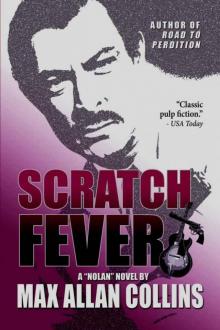 Scratch Fever
Scratch Fever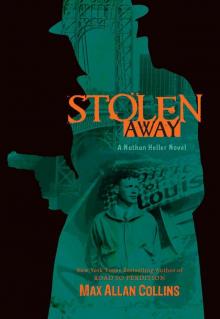 Stolen Away
Stolen Away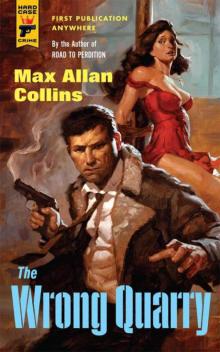 The Wrong Quarry (Hard Case Crime)
The Wrong Quarry (Hard Case Crime) Quarry
Quarry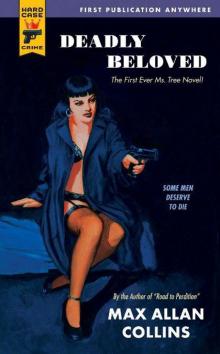 Hard Case Crime: Deadly Beloved
Hard Case Crime: Deadly Beloved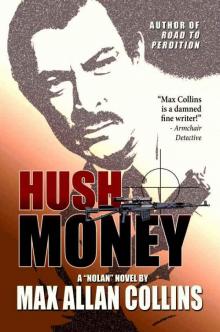 Hush Money
Hush Money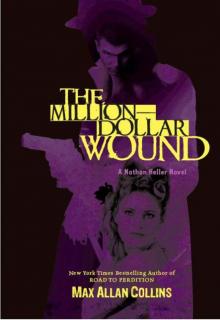 The Million-Dollar Wound
The Million-Dollar Wound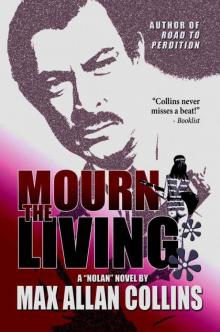 Mourn The Living
Mourn The Living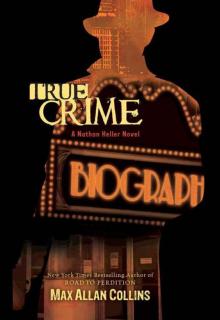 True Crime
True Crime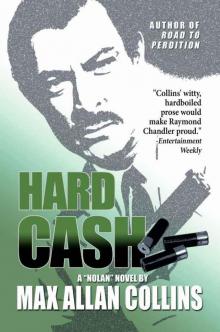 Hard Cash
Hard Cash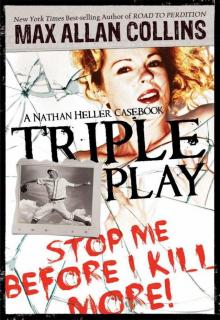 Triple Play: A Nathan Heller Casebook
Triple Play: A Nathan Heller Casebook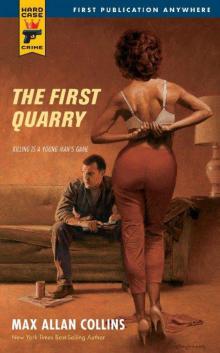 Hard Case Crime: The First Quarry
Hard Case Crime: The First Quarry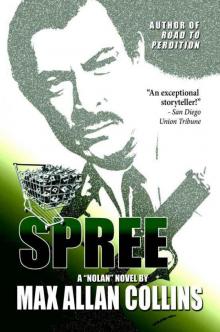 Spree
Spree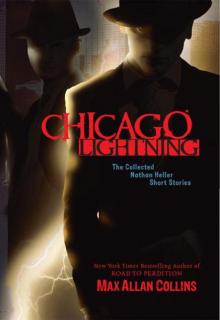 Chicago Lightning : The Collected Nathan Heller Short Stories
Chicago Lightning : The Collected Nathan Heller Short Stories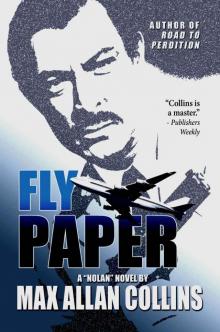 Fly Paper
Fly Paper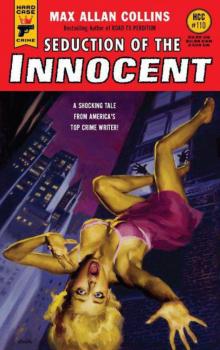 Seduction of the Innocent (Hard Case Crime)
Seduction of the Innocent (Hard Case Crime)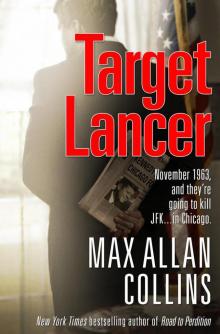 Target Lancer
Target Lancer